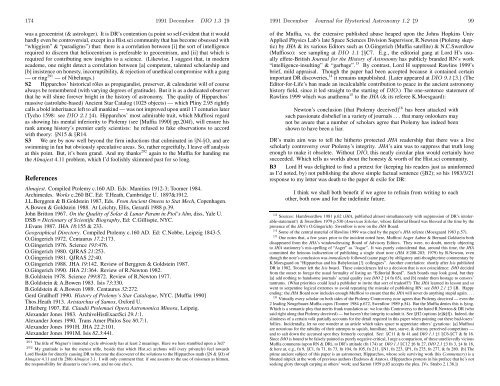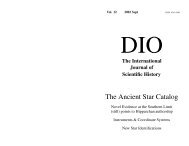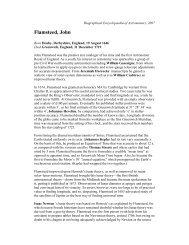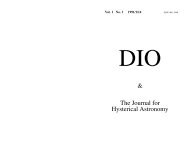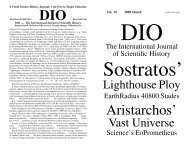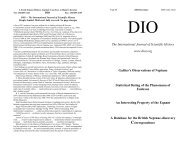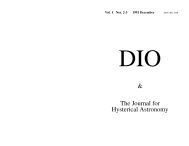DIO vol. 1, # 2-3 - DIO, The International Journal of Scientific History
DIO vol. 1, # 2-3 - DIO, The International Journal of Scientific History
DIO vol. 1, # 2-3 - DIO, The International Journal of Scientific History
Create successful ePaper yourself
Turn your PDF publications into a flip-book with our unique Google optimized e-Paper software.
174 1991 December <strong>DIO</strong> 1.3 ‡9<br />
was a geocentrist (& astrologer). It is DR’s contention (a point so self-evident that it would<br />
hardly even be controversial, except in a Hist.sci community that has become obsessed with<br />
“whiggism” & “paradigms”) that: there is a correlation between [i] the sort <strong>of</strong> intelligence<br />
required to discern that heliocentrism is preferable to geocentrism, and [ii] that which is<br />
required for contributing new insights to a science. (Likewise, I suggest that, in modern<br />
academe, one might detect a correlation between [a] competent, talented scholarship and<br />
[b] insistence on honesty, incorruptibility, & rejection <strong>of</strong> unethical compromise with a gang<br />
— or ring 291 — <strong>of</strong> Nibelungs.)<br />
S2 Hipparchos’ historical rôles as propagandist, preserver, & calendarist will <strong>of</strong> course<br />
always be remembered (with varying degrees <strong>of</strong> gratitude). But it is as a dedicated observer<br />
that he will shine forever bright in the history <strong>of</strong> astronomy. <strong>The</strong> quality <strong>of</strong> Hipparchos’<br />
massive (astrolabe-based) Ancient Star Catalog (1025 objects) — which Pliny 2.95 rightly<br />
calls a bold inheritance left to all mankind — was not improved upon until 17 centuries later<br />
(Tycho 1598: see <strong>DIO</strong> 2.1 ‡4). Hipparchos’ most admirable trait, which Muffiosi regard<br />
as showing his mental inferiority to Ptolemy (see [Muffia 1990] pp.204f), will ensure his<br />
rank among history’s premier early scientists: he refused to fake observations to accord<br />
with theory: §N15 & §R14.<br />
S3 We are by now well beyond the firm inductions that culminated in §N-§O, and are<br />
swimming in fun but obviously speculative areas. So, rather regretfully, I leave <strong>of</strong>f analysis<br />
at this point. But, it’s been grand. And my thanks 292 again to the Muffia for handing me<br />
the Almajest 4.11 problem, which I’d foolishly skimmed past for so long.<br />
References<br />
Almajest. Compiled Ptolemy c.160 AD. Eds: Manitius 1912-3; Toomer 1984.<br />
Archimedes. Works c.260 BC. Ed: T.Heath, Cambridge U. 1897&1912.<br />
J.L.Berggren & B.Goldstein 1987, Eds. From Ancient Omens to Stat Mech, Copenhagen.<br />
A.Bowen & Goldstein 1988. At Leichty, Ellis, Gerardi 1988 p.39.<br />
John Britton 1967. On the Quality <strong>of</strong> Solar & Lunar Param in Ptol’s Alm, diss, Yale U.<br />
DSB = Dictionary <strong>of</strong> <strong>Scientific</strong> Biography, Ed: C.Gillispie, NYC.<br />
J.Evans 1987. JHA 18:155 & 233.<br />
Geographical Directory. Compiled Ptolemy c.160 AD. Ed: C.Nobbe, Leipzig 1843-5.<br />
O.Gingerich 1972. Centaurus 17.2:173.<br />
O.Gingerich 1976. Science 193:476.<br />
O.Gingerich 1980. QJRAS 21:253.<br />
O.Gingerich 1981. QJRAS 22:40.<br />
O.Gingerich 1988. JHA 19:142. Review <strong>of</strong> Berggren & Goldstein 1987.<br />
O.Gingerich 1990. JHA 21:364. Review <strong>of</strong> R.Newton 1982.<br />
B.Goldstein 1978. Science 199:872. Review <strong>of</strong> R.Newton 1977.<br />
B.Goldstein & A.Bowen 1983. Isis 73:330.<br />
B.Goldstein & A.Bowen 1989. Centaurus 32:272.<br />
Gerd Graßh<strong>of</strong>f 1990. <strong>History</strong> <strong>of</strong> Ptolemy’s Star Catalogue, NYC. [Muffia 1990]<br />
Thos.Heath 1913. Aristarchus <strong>of</strong> Samos, Oxford U.<br />
J.Heiberg 1907, Ed. Claudii Ptolemaei Opera Astronomica Minora, Leipzig.<br />
Alexander Jones 1983. ArchiveHistExactSci 29.1:1.<br />
Alexander Jones 1990. Trans Amer Philos Soc 80.7:1.<br />
Alexander Jones 1991H. JHA 22.2:101.<br />
Alexander Jones 1991M. Isis 82.3:441.<br />
291 <strong>The</strong> title <strong>of</strong> Wagner’s immortal cycle obviously has at least 2 meanings. Have we here stumbled upon a 3rd?<br />
292 My gratitude is but the merest trifle, beside that which Hist.sci archons will (very privately) feel towards<br />
Lord Hoskin for directly causing DR to become the discoverer <strong>of</strong> the solutions to the Hipparchos math (§N & §O) <strong>of</strong><br />
Almajest 4.11 and (fn 288) Almajest 3.1. I will only comment that: if one assents to the use <strong>of</strong> missmen as hitmen,<br />
the responsibility for disaster is one’s own, and no one else’s.<br />
1991 December <strong>Journal</strong> for Hysterical Astronomy 1.2 ‡9 99<br />
<strong>of</strong> the Muffia, vs. the extensive published abuse heaped upon the Johns Hopkins Univ<br />
Applied Physics Lab’s late Space Sciences Division Supervisor, R.Newton (Ptolemy skeptic)<br />
by JHA & its various Editors such as O.Gingerich (Muffia satellite) & N.C.Swerdlow<br />
(Muffioso): see sampling at <strong>DIO</strong> 1.1 ‡§C7. E.g., the editorial gang at Lord H’s usually<br />
effete-British <strong>Journal</strong> for the <strong>History</strong> <strong>of</strong> Astronomy has publicly branded RN’s work<br />
“intelligence-insulting” & “garbage”. 13 By contrast, Lord H suppressed Rawlins 1999’s<br />
brief, mild appraisal. Though the paper had been accepted because it contained certain<br />
important DR discoveries, 14 it remains unpublished. [Later appeared at <strong>DIO</strong> 9.1 ‡3.] (<strong>The</strong><br />
Editor-for-Life’s ban made an incalculable contribution to peace in the ancient astronomy<br />
history field, since it led straight to the starting <strong>of</strong> <strong>DIO</strong>.) <strong>The</strong> one-sentence statement <strong>of</strong><br />
Rawlins 1999 which was anathema 15 to the JHA (& its referee K.Moesgaard):<br />
Newton’s conclusion [that Ptolemy deceived] 16 has been attacked with<br />
such passionate disbelief in a variety <strong>of</strong> journals . . . that many onlookers may<br />
not be aware that a number <strong>of</strong> scholars agree that Ptolemy has indeed been<br />
shown to have been a liar.<br />
DR’s main aim was to tell the hitherto protected JHA readership that there was a live<br />
scholarly controversy over Ptolemy’s integrity. JHA’s aim was to suppress that truth long<br />
enough to make it obsolete. Without <strong>DIO</strong>, this neatly circular plan would certainly have<br />
succeeded. Which tells us worlds about the honesty & worth <strong>of</strong> the Hist.sci community.<br />
B3 Lord H was delighted to find a pretext for (keeping his readers just as uninformed<br />
as I’d noted, by) not publishing the above simple factual sentence (§B2); so his 1983/3/21<br />
response to my letter was death to the paper & exile for DR:<br />
I think we shall both benefit if we agree to refrain from writing to each<br />
other, both now and for the indefinite future.<br />
13 Sources: HamSwerdlow 1981 p.62 (JHA, published almost simultaneously with suppression <strong>of</strong> DR’s intolerable-statement!)<br />
& Swerdlow 1979 p.530 (American Scholar, whose Editorial Board was blessed at the time by the<br />
presence <strong>of</strong> the JHA’s O.Gingerich). Swerdlow is now on the JHA Board.<br />
14 Some <strong>of</strong> the central material <strong>of</strong> Rawlins 1999 was cited by the paper’s JHA referee (Moesgaard 1983 p.57).<br />
15 One notes that, a few years prior to the incident noted here, Muffiosi Asger Aaboe & Bernard Goldstein both<br />
disappeared from the JHA’s windowdressing Board <strong>of</strong> Advisory Editors. <strong>The</strong>y were, no doubt, merely objecting<br />
to JHA stationery’s mis-spelling <strong>of</strong> “Asger” as “Asgar”. It was purely coincidental that, around this time, the JHA<br />
committed the heinous indiscretion <strong>of</strong> publishing a single short note (JHA 8:200-203; 1979) by R.Newton, even<br />
though the note’s conclusion was immediately followed (same page) by obligatory anti-thoughtcrime commentary by<br />
K.Moesgaard on “Hipparchus and his Babylonian [!] colleagues”. Another correlation: shortly after Isis published<br />
DR in 1982, Toomer left the Isis board. <strong>The</strong>se coincidences led to a decision that is not coincidence: <strong>DIO</strong> decided<br />
from the outset to forego the usual formality <strong>of</strong> listing an “Editorial Board”. Such boards may look good, but they<br />
[a] add nothing to handsome journals’ actual quality (see <strong>DIO</strong> 2 ‡4 fn 65), and [b] render them hostage to censors’<br />
tantrums. (What priorities could lead a publisher to invite that sort <strong>of</strong> trade<strong>of</strong>f?) <strong>The</strong> JHA learned its lesson and so<br />
went to serpentine logical extremes to avoid repeating the mistake <strong>of</strong> publishing RN: see <strong>DIO</strong> 2.1 ‡3 §B. Happy<br />
ending: the JHA Board now includes enough Muffiosi to ensure that the JHA will never do anything stupid again. . . .<br />
16 Virtually every scholar on both sides <strong>of</strong> the Ptolemy Controversy now agrees that Ptolemy deceived — even the<br />
2 leading Neugebauer-Muffia capos (Toomer 1984 p.672, Swerdlow 1989 p.54). But the Muffia denies this is lying.<br />
Which is a semantic ploy that merits frank translation as: we lost this Controversy to the hated R.Newton & DR (who<br />
said right along that Ptolemy deceived) — but haven’t the integrity to admit it. See §H2 (options [e]&[f]). Indeed, the<br />
sliminess <strong>of</strong> a certain <strong>vol</strong>k partially accounts for the detail required in this paper when pointing out these bad-losers’<br />
follies. Incidentally, let no one wonder at an article which takes space to appreciate others’ gyrations: [a] Muffiosi<br />
are notorious for the rabidity <strong>of</strong> their attempts to squish, humiliate, hurt, starve, & destroy perceived competitors —<br />
and to salt down the accursed spot they formerly occupied. See: §C11 & fn 41 and <strong>DIO</strong> 1.1 ‡1 §C6-§C7 & fn 16.<br />
Since <strong>DIO</strong> is bound to be falsely painted as purely negative-critical, I urge a comparison, <strong>of</strong> these unrelievedly vicious<br />
Muffia comments (upon RN & DR), to DR’s attitude (fn 174) at: <strong>DIO</strong> 1.1 §C12 ‡6 fn 27, <strong>DIO</strong> 2.1 ‡3 fn 3, ‡4 fn 18,<br />
& here at, e.g., fn 9, §C1, fn 71, fn 73, fn 104, fn 105, fn 211, §N1, fn 223, §P1, fn 275, fn 277, & fn 280. [b] <strong>The</strong><br />
prime ancient subject <strong>of</strong> this paper is an astronomer, Hipparchos, whose sole surviving work (his Commentary) is a<br />
bloated nitpick at the work <strong>of</strong> previous authors (Eudoxos & Aratos). (Hipparchos protests in his preface that he’s not<br />
seeking glory through carping at others’ work; and Sarton 1959 p.65 accepts the plea. [Vs. Strabo 2.1.36.])


